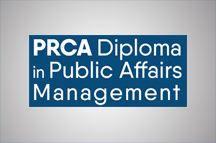Dealing with politics and policy-making can seem challenging, even scary. But underneath all the apparent ‘smoke and mirrors’, lies a key aspect of PR that is fundamental to risk and reputation management.
Some are put off from getting involved in politics because they do not understand it, others get involved because they think they understand all about it. The reality is that there is a lot to learn about how to engage effectively with this very special type of audience. At its heart, public affairs is about communication so is no different from other parts of PR. But the audience that we deal mostly with, politicians, is very different. Why? Because they have to be elected.
The recognition that there is a lot to learn is one of the reasons why the PRCA and Public Affairs Board established the Diploma in Public Affairs Management.
But it is also the case that the role of public affairs is not always widely recognised across PR. So it is always worth taking a moment to consider the benefits of good public affairs engagement.
Politics is critical to operations – for some that may be about doing business with government, for others politicians are setting the regulations and environment for doing business with others. This applies to whether you are representing business, charities, NGOs or any other type of organisation. It could be about grants and awards being made available, support to sectors or supportive policies. All can be business critical decisions that politicians are making.
Politicians know the value of reputation – whether it is questions in Parliament, tweets or Select Committee reports, politicians know that people and the media listen to them.
Public affairs is worth investing in – to be able to cope well, the public affairs team needs resources. This can include people or the provision of services to help them deliver (media and parliamentary monitoring for instance) but the team also needs to have training available as well.
Public affairs is part of risk management – politicians always need to keep the agenda moving forward not least to show delivery or ideas for the next set of elections. Such moving policy developments open up potential risks that need should be managed.
Public affairs is also about allowing opportunities to be identified – it is not just about managing risk but potentially identifying new opportunities, seeking potential new markets or ensuring that politicians do not become ‘over-excited’ about emerging opportunities or technologies. Anything new is often misunderstand and that is especially the case where it comes to technology.
But it is not just me or the PRCA highlighting the benefits of public affairs. Considering the role of lobbying (for me, a key aspect of public affairs), the Cabinet Office said it: “serves an important function in politics – by putting forward the views of stakeholders to policy makers, it helps in the development of better legislation.”
So good engagement leads to better legislation but to deliver that engagement is the stuff of good public affairs – understanding the audiences, the processes, what makes for good engagement and the critical focus on solutions.
These are some of the issues that we look at in the PRCA Diploma in Public Affairs Management. If you are new to PR and Public Affairs, or a more experienced communicator that finds themselves have to deal with politics, then participation in the Diploma will help. Click here for more details about the six month course which starts on 1st March 2021 and take advantage of the 10% PubAffairs Member discount.
Dr Stuart Thomson, Head of Public Affairs, BDB Pitmans and Course Leader, PRCA Diploma in Public Affairs Management















.jpg)